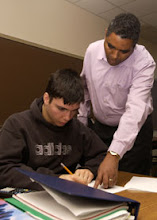[You may wish to read the two previous blogs on the future
of work: …the Class of 2012 and book a space before starting this one.]
The very nature of work and workplace arrangements, worker
compensation, as well as the size, composition, and skills of the workforce are
being challenged by the forces which have already disrupted other aspects of
life. Smart machines are automating both
basic and highly specialized routine procedures. Atomizing jobs are allowing
deep specialization, propelling productivity, cutting cost per unit and improving
product quality. A bachelor’s degree replaces
a high school diploma as the minimum for entry into the job market. Global
interconnectivity puts diversity and adaptability at the heart of
organizational operations, foreign workers are equally attractive to domestic
businesses, and globally distributed work is becoming routine.
So, what does this mean for future workers? Workers are cut loose from direct supervision,
a daily clockwork routine and permanency of income. In effect, workers become a new class of
hunter-gathers foraging for daily sustenance. Success will necessitate—to say
the least, a new set of foraging skills!
The Institute for the Future (IFTF), a highly respected forecasting
organization, published Future Work
Skills 2020 identifying not only the forces disrupting work but also the skills
to navigate. While I encourage you to
access and read the entire report, I highlight the ten skills below.
- Sense-Making: ability to determine the deeper meaning or significance of what is being expressed
- Social Intelligence: ability to connect to others in a deep and direct way, to sense and stimulate reactions and desired interaction
- Novel & Adaptive Thinking: proficiency at thinking and coming up with solutions and responses beyond that which is rote or rule-based
- Cross-Cultural Competency: ability to operate in different cultural settings
- Computational Thinking: ability to translate vast amounts of data into abstract concepts and to understand data-based reasoning
- New-Media Literacy: ability to critically assess and develop content that uses new media forms, and to leverage these media for persuasive communication
- Transdisciplinarity: literacy in and ability to understand concepts across multiple disciplines
- Design Mindset: ability to represent and develop tasks and work processes for desired outcomes
- Cognitive Load Management: ability to discriminate and filter information for importance, and to understand how to maximize cognitive functioning using a variety of tools and techniques
- Virtual Collaboration: ability to work productively, drive engagement, and demonstrate presence as a member of a virtual team
To prepare the mind for change is, I believe, the first step
on the journey into the unknown. So,
last week I lead my microeconomics students into the future of work 2020. On their final exam students had an
opportunity for self-reflection on the challenges that lie ahead. They worry that, perhaps, they are not being
properly trained for the emerging work world. They lamented
that their personal habits, self-discipline, self-starter ability, and time-money
management skill, may not be sufficiently strong to assure success as contingent workers. They want the path of
connection to communities-of-work in a brokered world to be illuminated. Some expressed concern that post-secondary
institutions may not be doing enough to prepare them for their journey into
tomorrow. They offer some suggestions: create deeper specialization within the major,
diversify across programs and disciplines to assure accumulation of more skills
and knowledge, and offer practical opportunities to hone entrepreneurial skills
that will help bridge the gap from permanent worker to contingency status. Students recognize that proficiency, as well as,
comfort with digital communications technologies is a new workplace necessity.
Our future workers have spoken. What did we hear…better yet, what will we do to enable
their success. Truly, another WAIT-T (we’re all in this together) question.
When we try to pick out anything by itself, we find it
hitched to everything else in the Universe. –John Muir, 1911.
 Kay Strong, Ph.D., Southern Illinois University, M.T., University of Houston, M.A., Ohio University; Associate Professor at Baldwin-Wallace College; Areas of expertise: international economics, contemporary social-economic issues, complexity and futures-based perspectives in economics. E-mail: kstrong@bw.edu
Kay Strong, Ph.D., Southern Illinois University, M.T., University of Houston, M.A., Ohio University; Associate Professor at Baldwin-Wallace College; Areas of expertise: international economics, contemporary social-economic issues, complexity and futures-based perspectives in economics. E-mail: kstrong@bw.edu

No comments:
Post a Comment